Essay On Belief Systems (Structure/Outline)
- Introduction
- Characteristics of Belief Systems
- Types of Belief Systems
- Importance of Belief Systems
- FAQ’S

Introduction
Belief systems are important aspects of human societies in all parts of the world. They are complex structures of values and beliefs that form to guide individual and group behavior. Belief systems often embody culturally shared concepts of ‘right’ and ‘wrong’, along with ideas about the supernatural, morality, and justice.
Generally, belief systems will consist of forms of rituals, symbols, ceremonies, stories, practices, and beliefs about life after death and more which serve as a means for people to make sense of the world around them.
Additionally, belief systems offer the basis from which communities make decisions about how best to live their lives both individually and collectively. As such, they can have an enduring impact on our culture as they shape attitudes and attitudes toward others in necessary ways.
Characteristics of Belief Systems
Belief systems are characterized by their ability to provide meaning and direction in life. Belief systems consist of numerous components that together form a collective framework which is usually shared within a particular culture or society.
These components typically include symbols, stories, rituals, practices, and laws which are meant to reinforce the values of the system. Belief systems often share certain characteristics, including:
- Shared stories and legends that explain the origins of a belief system or provide clues about its purpose.
- Rituals – such as ceremonies or rites – are performed within certain contexts in order to reinforce the values and beliefs of the system.
- Symbols that represent key themes within a belief system, such as power and authority.
- Practices that express the core beliefs of the system, such as prayer and meditation.
- Beliefs about life after death and how to achieve it in order to have an eternal reward or blessing within that belief system.
- Rules or laws regulate behavior according to the values and beliefs of the system.
- A code of ethics guides individuals as to how they should behave in order to be in line with the belief system’s values and beliefs.
- Cosmology or worldviews explain how the universe works according to that particular belief system.
- It is important to remember that belief systems are not set in stone, but rather they evolve over time as cultures change and develop.
Ultimately, it is up to each individual to decide which beliefs they want to follow and how they want to express them. By doing this, we can create our own unique way of understanding and interpreting the world around us.
Types of Belief Systems
Belief systems can be divided into various categories based on their origin, purpose, and scope. Generally speaking, belief systems are monotheistic or polytheistic, naturalistic or supernaturalistic in nature.
Monotheism refers to the belief in one God or higher being who is responsible for all that exists. Polytheism describes the belief in multiple deities or gods who each have control over different aspects of life.
Naturalistic belief systems focus on the physical and natural realm, while supernaturalistic belief system emphasizes spiritual aspects such as reincarnation, the afterlife, etc.
Additionally, there are also religious belief systems that derive from traditional texts such as the Bible and Quran, as well as philosophical systems which explore the nature of being and purpose.
Each type of belief system has its own unique set of principles, rituals, symbols, stories, and laws that serve to shape how people live their lives.
1- Political Belief System
Political belief systems are those which focus on the political, economic, and social structure of a society. These types of belief systems are centered around concepts such as freedom, democracy, justice, and equality.
Political beliefs tend to be diverse in nature as different groups within a society have varying perspectives on what constitutes a “just” or “free” society. Political belief systems can also be divided into different ideologies, such as liberalism and conservatism, which offer differing views on how a society should be organized and governed.
Political belief systems have an important role to play in shaping the direction of a nation or community, as they often influence public policy decisions that affect everyone’s lives. Political beliefs often focus on equality, freedom of speech, and individual rights.
This type of system is typically derived from philosophical ideals or religious teachings and can be expressed through various forms such as legal systems, constitutions, laws, public policies, or cultural customs. Political belief systems typically have a direct impact on the way in which people live their lives and are often used as a means of maintaining order and stability within society.
2- Spiritual Belief System
Spiritual belief systems focus on the realm of the non-physical and are often centered around concepts such as soul, spirit, karma, and enlightenment. These types of belief systems tend to be more individualistic in nature, as each person’s spiritual path is unique and personal to them.
Spiritual beliefs can also be divided into various religions or traditions which provide guidelines and structure for spiritual practices. Examples of these include Buddhism, Hinduism, Taoism, Shamanism, etc.
Spiritual belief systems can be a powerful tool for personal growth and transformation as they focus on developing one’s inner awareness and understanding of the universe.
3- Religious belief systems
These are typically based on a particular faith or tradition, such as Christianity, Islam, Judaism, Hinduism, etc. These types of belief systems can involve attending religious services and ceremonies, adhering to certain moral codes or customs, and living one’s life according to certain spiritual principles. Additionally, religious belief systems often emphasize the importance of having faith in one’s beliefs and following certain spiritual practices such as prayer or meditation.
Religious belief systems can be a powerful source of strength, guidance, and hope for many people. These types of beliefs can provide comfort during difficult times by offering a sense of connection to something greater than oneself.
Importance of Belief Systems
Belief systems are important as they give individuals and communities a sense of purpose and meaning. They can be used to pass on values, traditions, and beliefs from one generation to the next.
Additionally, belief systems help to form a sense of identity by providing an individual or group with a shared set of beliefs and practices that allow them to feel connected to something larger than themselves.
Finally, belief systems can play a role in promoting peace and harmony within society as they help to provide guidelines on how to interact with one another in an ethical and responsible manner.
Belief systems have been an important part of human societies for centuries. They provide meaning and purpose in life, offering a collective framework from which individuals can make sense of their world. By understanding how belief systems work and what characteristics they share, we can gain a better understanding of our own culture and those around us.
Belief systems are powerful forces at work in our societies, shaping how we think, feel, and act. They provide us with a shared language to communicate our values and beliefs, as well as a framework for making decisions about life.
FAQ’S
What is a basic belief system?
A basic belief system is a set of beliefs that provide individuals or groups with a sense of identity, purpose, and meaning.
What are the five core religions?
The five core religions are Christianity, Islam, Judaism, Hinduism, and Buddhism.
What is a personal belief system?
Personal belief systems are individualistic in nature and focus on the realm of the non-physical. These types of beliefs tend to be based on subjective experiences, personal values, morals, and spiritual practices.
How do belief systems affect society?
Belief systems affect society in many ways, such as providing a set of shared values and beliefs with which individuals can make sense of their world.
Additionally, belief systems can play an important role in promoting peace and harmony within society by helping to provide guidelines on how to interact with one another in an ethical and responsible manner.
Essay On Belief Systems (Pictures & PDF)
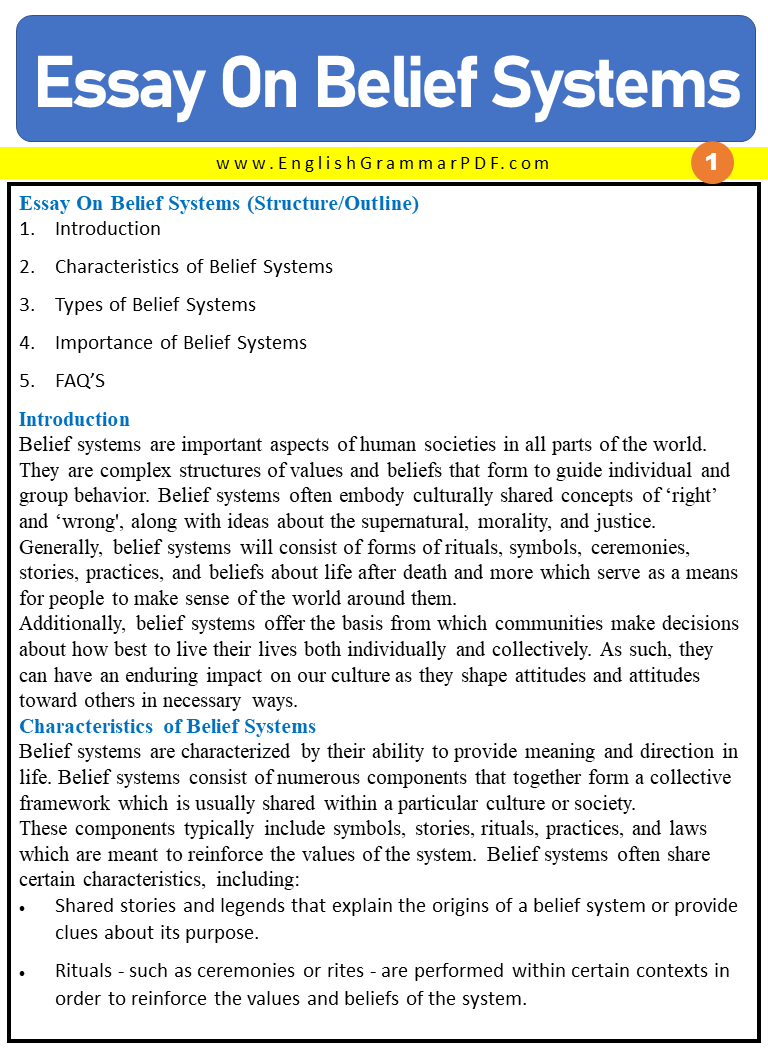
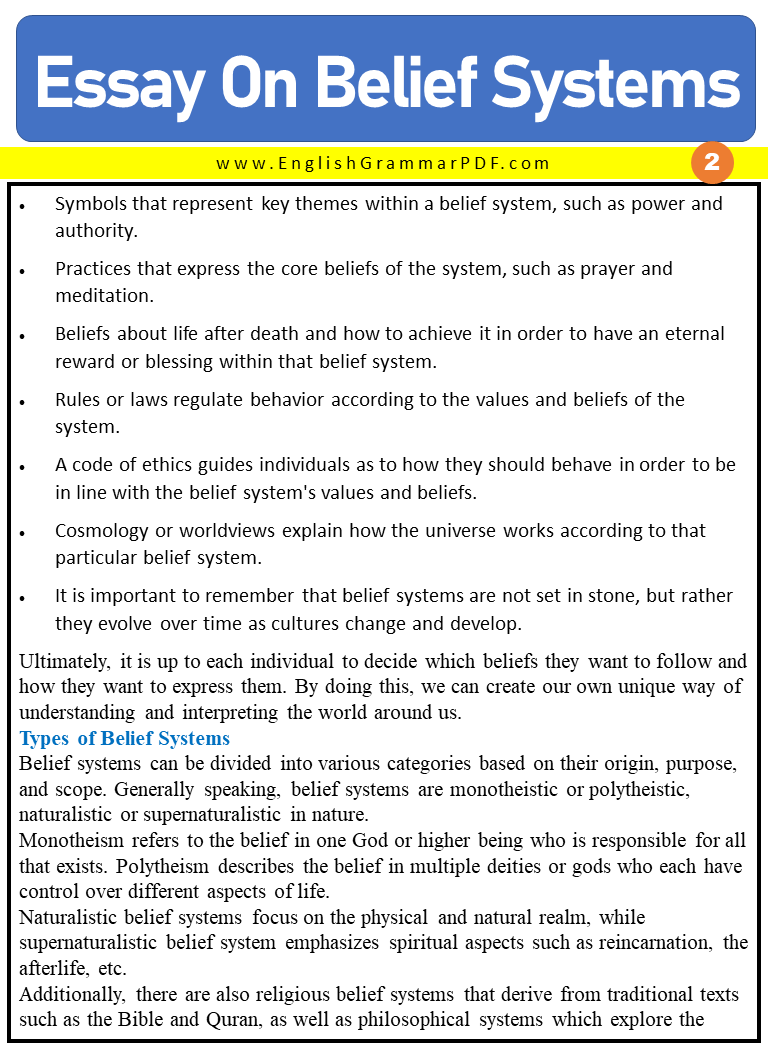
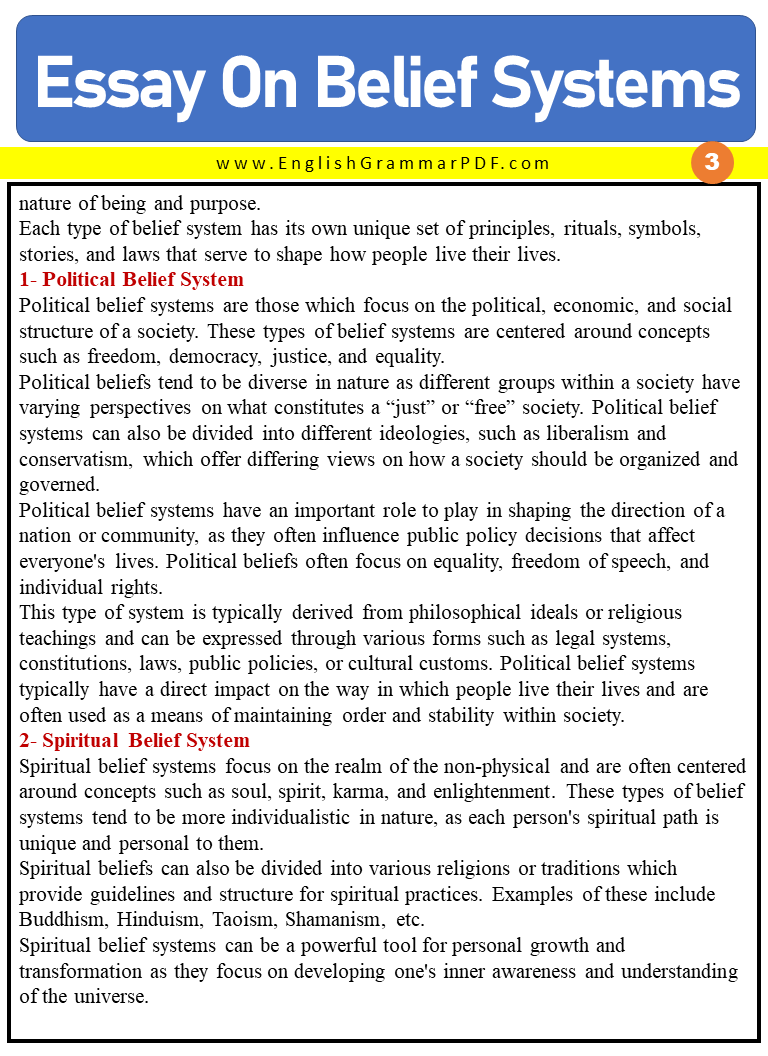
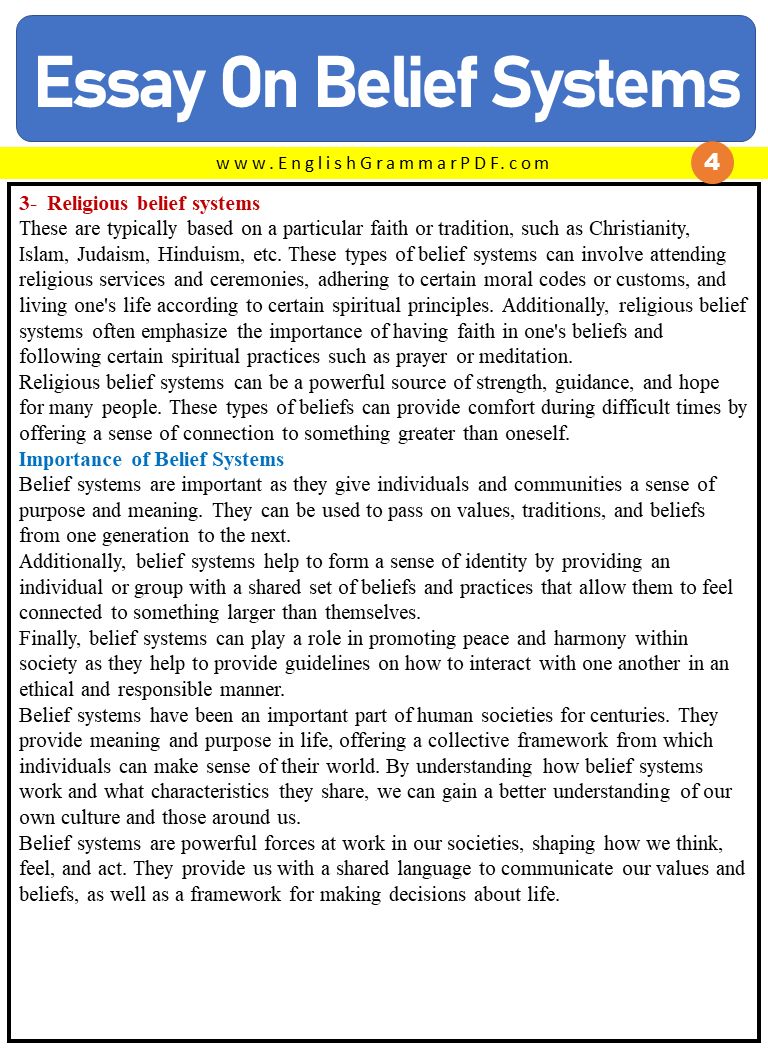
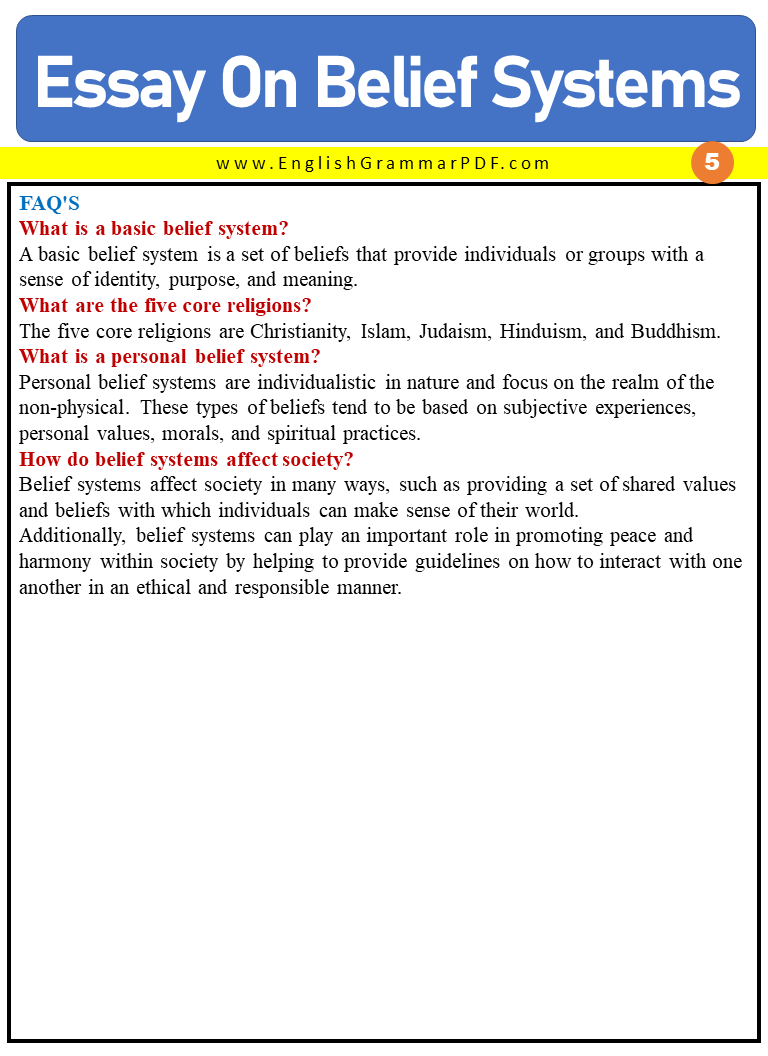
Related: Essay on God
Below is the PDF of this Essay.


